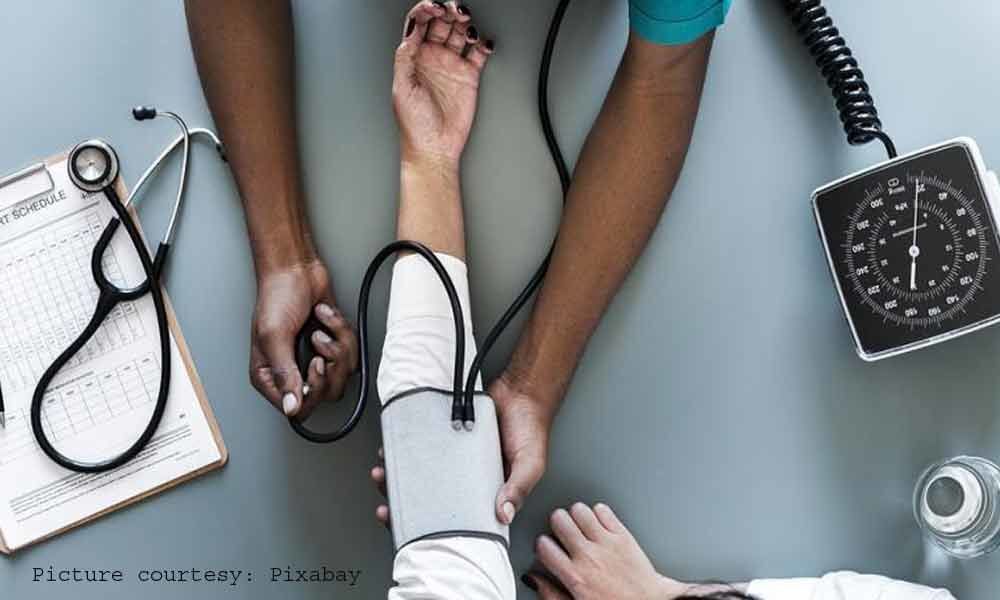Live
- Nizamabad MP Dharmapuri Arvind and Jagtial MLA Dr. Sanjay Kumar Meet CM Revanth Reddy
- Hyderabad CP CV Anand Issues Stern Warning to Bouncers
- MP Laxman Criticizes Police Conduct, Calls for Support for Victims' Families
- Fire Breaks Out in Kachiguda-Chennai Egmore Express, Passengers Evacuated Safely
- CM Revanth Reddy Condemns Attacks on Film Personalities' Homes, Calls for Strict Action
- Victory Venkatesh and Nandamuri Balakrishna to Set Screens on Fire with Unstoppable Season 4
- Over 71.81 crore Ayushman Bharat Health Account numbers generated: Centre
- In special gesture, Kuwait's Prime Minister sees-off PM Modi at airport after conclusion of historic visit
- Veer crowned PGTI Ranking champion, Shaurya wins emerging player honour
- Sr National Badminton: Unseeded Rounak Chauhan, Adarshini Shri reach singles semis
Just In

On the occasion of World Hypertension Day on 17th May, heart experts at Asian Heart Institute share 7 heart-healthy tips to help keep your blood pressure in check.
Hypertension is also called 'the silent killer' because high blood pressure often causes no symptoms for a long time.
"Hypertension (in addition to a sedentary lifestyle, unhealthy diet and nicotine use) is a major contributing risk factor for heart disease. Prevalence of hypertension in young individuals is on the rise. One of the main reasons is that they are less likely to seek medical attention as they feel that they are absolutely fit and fine. It can thus remain undetected for a long time," shares Dr Ramakanta Panda, world's leading heart surgeon and vice chairman of Asian Heart Institute
Unfortunately, some people may not realise they have high blood pressure until they experience a heart attack, a stroke, kidney damage or other serious health problems. Unregulated hypertension also increases the risk of erectile dysfunction in young men. Therefore, regular blood pressure check-ups are necessary. Patients who suffer from an existing condition of hypertension apart from checking their blood pressure, need to follow an intake of prescribed medication regularly.
"A person is known to be hypertensive when his/her blood pressure remains more than 140 mm Hg systolic and 90 mm Hg diastolic. If you have never been diagnosed with hypertension and you have no other serious medical problems, the American Heart Association recommends that you have your blood pressure checked at least once every 2 years," adds Dr Santosh Kumar Dora, senior cardiologist, Asian Heart Institute.
Data reveals that the prevalence of hypertension among the urban middle class is 32% in men and 30% in women.
One should try every possible means to prevent hypertension as there is no complete cure for it. Lifestyle modification is a very important medium here.
Following are some useful recommendations to prevent and/or treat hypertension.
1. Follow a DASH Diet: The diet should contain low fat, less salt and more vegetables and fruits along with whole grain cereals. The DASH (Dietary approach to stop hypertension) eating pattern helps in preventing hypertension which consists of a diet rich in fruits and vegetables, no fat or low-fat milk and milk products, whole grain foods, fish, poultry, beans and seeds, as well as unsalted nuts.
2. No substitute for Regular Exercise: Regular exercise is as important as taking medicines. Physical exercise does not only help control your blood pressure, but also aids weight loss, blood sugar regulation and effective stress management- all of which are key for a healthy heart. One should do aerobic exercises on a regular basis for around 45 minutes to 1 hour daily for at least 5 days a week. Exercises such as brisk walking, stair-climbing, jogging, running and swimming can help you stay fit.
3. Weight loss is a must: Obesity is one of the major risk factors for high blood pressure, diabetes and heart disease. Your blood pressure can rise with an increase in body weight. On the other hand, even a small amount of weight loss can help to prevent as well as regulate high blood pressure. Weight is considered healthy when the body mass index is between 20 to 25.
4. Managing Stress is the key: Mayo Clinic suggests that even though there is no proof that stress by itself causes long-term blood pressure, however reacting to it in unhealthy ways can increase your risk of hypertension. For example, stress inducing habits such as smoking, drinking and junk food consumption can have cascading effects on your blood pressure. Therefore, one should know how to manage stress. Yoga, meditation, adequate sleep and positive thinking are some of the strategies to manage your stress. Yoga can improve sleep, reduce stress hormone levels in the body which helps in brining down the blood pressure. If needed one should consult a stress management expert for advice.
5. Avoid Alcohol: Excess alcohol consumption can lead to hypertension. It is better to completely avoid alcohol. If consumed, it is advisable to limit the intake to one or two drinks per week only.
6. Say no to Smoking: Smoking is a risk factor for many other diseases including hypertension and should be stopped completely. Research suggests that each cigarette you smoke temporarily increases your blood pressure for many minutes after you finish. For your overall health and to reduce your risk for heart attack and stroke, avoid all forms of tobacco as well as passive smoking.
7. Know your numbers: As one ages, hypertension becomes almost inevitable. The prevalence of hypertension increases with an advancing age to the point of being 50 percent in people within the range of 60–69 years of age and approximately 75 percent in those being 70 years of age and older. Therefore, it is important to track your BP. It is preferable to have a BP monitor at home, especially so if elderly people are at home. Home BP monitor usually comes in a digital format. Many companies produce home BP monitors. However, they should be calibrated at regular intervals to maintain their accuracy.

© 2024 Hyderabad Media House Limited/The Hans India. All rights reserved. Powered by hocalwire.com







